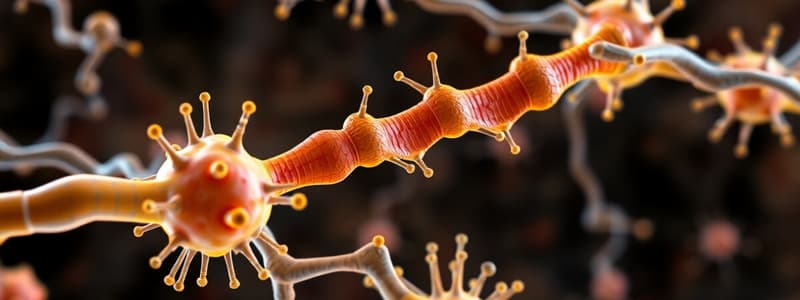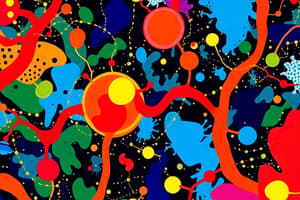Podcast
Questions and Answers
What is one way ion channels can be activated?
What is one way ion channels can be activated?
- By direct interaction with lipids
- By affecting protein synthesis within the cell
- By irreversible inhibition of enzymes
- By altering the level of expression of ion channels on the cell surface (correct)
Which type of drug action is exemplified by ACE inhibitors?
Which type of drug action is exemplified by ACE inhibitors?
- Competitive inhibitor (correct)
- Prodrug activation
- False substrate
- Irreversible, non-competitive inhibitor
What characterizes active transporters?
What characterizes active transporters?
- They rely on concentration gradients for transport
- They can only transport a single type of ion
- They are ATP dependent (correct)
- They do not require energy to transport molecules
What is a key feature of false substrates like fluorouracil?
What is a key feature of false substrates like fluorouracil?
How does the transport of organic molecules typically occur with inactive transport?
How does the transport of organic molecules typically occur with inactive transport?
Flashcards
Indirect Ion Channel Activation
Indirect Ion Channel Activation
Ion channels can be activated indirectly through a G protein and other intermediaries. This involves a chain of events where a signal binds to a receptor, activating the G protein, which then triggers a series of downstream events leading to the opening of the ion channel.
Altering Ion Channel Expression
Altering Ion Channel Expression
Some drugs, like gabapentin, can decrease the number of ion channels on the cell surface by interfering with their insertion into the plasma membrane. This impacts the overall number of channels available for signaling.
Competitive Enzyme Inhibition
Competitive Enzyme Inhibition
ACE inhibitors (ACEIs) compete with angiotensin I for binding to the active site of the angiotensin-converting enzyme (ACE), blocking its function in converting angiotensin I to angiotensin II. This decreases blood pressure by preventing vasoconstriction.
Irreversible Enzyme Inhibition
Irreversible Enzyme Inhibition
Signup and view all the flashcards
Prodrug Activation
Prodrug Activation
Signup and view all the flashcards
Study Notes
Ion Channels Activation
- Ion channels can be activated indirectly through G proteins and other intermediaries.
- The expression level of ion channels on the cell surface can be altered, impacting their function.
- Gabapentin is an example of a drug that reduces the insertion of neuronal calcium channels into the plasma membrane.
Enzymes
- Drugs can affect enzyme function in several ways:
- Competitive inhibition (e.g., ACEIs)
- Irreversible/non-competitive inhibition (e.g., Aspirin)
- Using false substrates (e.g., fluorouracil)
- Enzymes also play a role in drug actions:
- Drug activation (prodrug activation)
- Drug metabolism
Transporters
- Active transport relies on ATP and specific carriers (e.g., ABC transporters).
- In passive transport, solute carriers move molecules across membranes.
- Coupled transport, or co-transport, occurs when the movement of one molecule is dependent on the movement of another, in the same or opposite direction (e.g., symport, antiport).
Studying That Suits You
Use AI to generate personalized quizzes and flashcards to suit your learning preferences.



